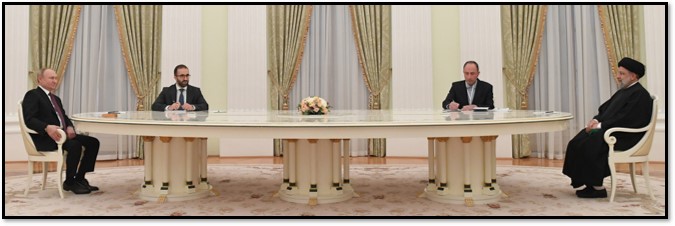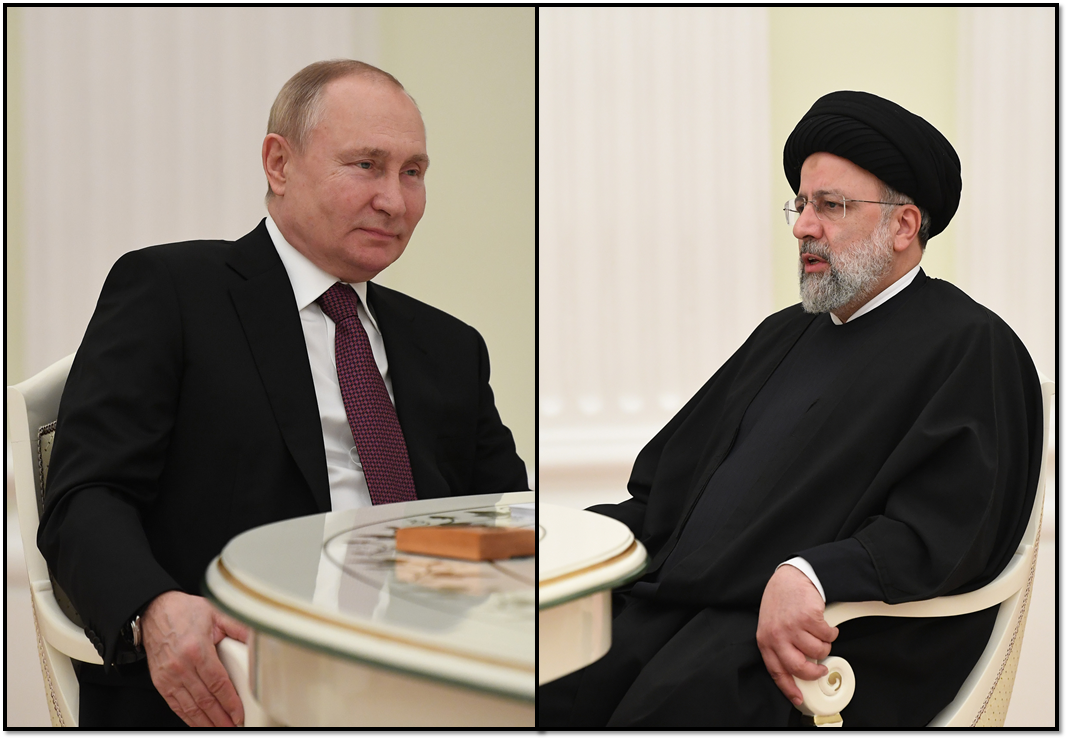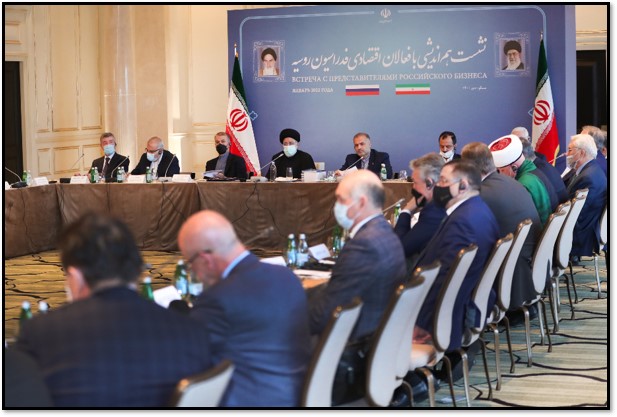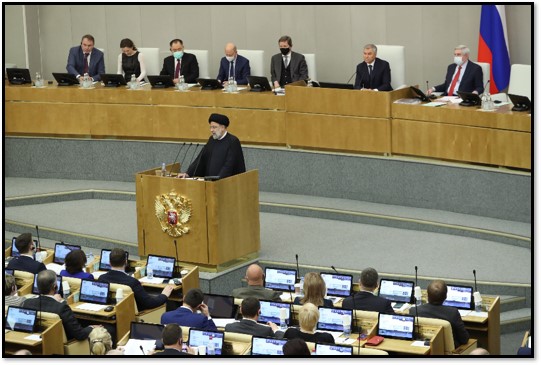On January 19, Iranian President Ebrahim Raisi arrived in Moscow to discuss expanding bilateral ties with Russia. In wide-ranging talks with President Vladimir Putin, Iran and Russia discussed cooperation on trade, banking, transportation, energy, regional security, and more.
“We in Iran have no limits for expanding ties with Russia,” Raisi said during a three-hour meeting at the Kremlin. The leaders sat on opposite sides of a long oval table but did not wear masks.

Raisi presented a draft of a new 20-year strategic cooperation agreement, which would supersede the original treaty from 2001, which was renewed twice.
Putin noted that bilateral trade increased by 38 percent in 2021. He said that the two nations were “doing much” to create a free trade zone between Iran and the five countries in the Russian-led Eurasian Economic Union. “Strengthening bilateral cooperation between Iran and Russia will boost the economies of the two countries and increase regional and global security,” Raisi said.
Raisi called for closer cooperation to counter pressure from the United States, a shared adversary. “Just like you, we have also stood up against U.S. sanctions from 40 years ago,” he noted. “Today’s exceptional circumstances require significant synergy between our two countries against U.S. unilateralism.”
Raisi’s visit came amid a tense standoff between Russia and the United States over Ukraine. Russia has positioned some 100,000 troops near the Ukraine border. The Biden administration has threatened to impose additional economic sanctions on Russia if it invades its eastern neighbor.

Raisi told Putin that Iran opposed an expanded Western military presence in Eurasia. “The infiltration of NATO under any guise in the Caucasus and Central Asia,” he said, “will threaten the common interests of independent countries.”
Putin lauded Russia’s “close cooperation” with Iran on international issues. “We can say that our efforts largely helped the Syrian government overcome the threats linked with international terrorism.” he said. Putin also underscored shared concerns over the security situation in Afghanistan, which shares a 560-mile border with Iran.
“Finally, it is very important for me to know your position on the Joint Comprehensive Plan of Action (the 2015 nuclear deal),” Putin told Raisi. Since April 2021, Iran and the world’s major powers have held eight rounds of talks to return the United States and Iran to full compliance with the agreement. Russia has historically been closer to Iran’s position on its controversial nuclear program, but Russian and U.S. diplomats have coordinated closely on trying to find a way to restore the deal.
Raisi’s response to Putin was not reported, but in a speech the following day, Raisi criticized the United States for not fulfilling its obligations under the nuclear deal. Iran is “serious about reaching an agreement if the other parties are serious about lifting the sanctions effectively and operationally,” he said at the Duma, the lower house of Russia’s parliament.
Raisi lashed out against the United States and the West in his address to Russian lawmakers. “The strategy of domination has now failed, and the United States is in its weakest position, and the power of independent nations is experiencing historic growth,” he said. Raisi accused Washington of trying to “weaken independent governments from within” through “economic sanctions, destabilization, promotion of insecurity, and false narratives of events.”
Foreign Minister Hossein Amir-Abdollahian, Petroleum Minister Javad Owji and Economy Minister Ehsan Khandoozi accompanied Raisi to Moscow. They said that they reached agreements with their Russian counterparts on banking, energy, trade, and transportation, but they did not provide many details.

The two-day trip was the first visit to Russia by an Iranian president since Hassan Rouhani’s visit in 2017. It was Raisi’s first state visit since taking office in August 2021. His only other trips abroad were to multilateral summits in neighboring Tajikistan and Turkmenistan.
Russia and Iran have had a rocky relationship since the early 19th century, when the Russian Empire annexed a large amount of Iranian territory. But the two countries have expanded political, economic and military cooperation since the early 2000s. They both oppose the U.S.-led world order, support the Assad regime in Syria, and see Sunni jihadist movements, such as ISIS, as serious threats. The following are key remarks by Iranian and Russian leaders and a timeline of visits to Russia by Iranian presidents.
Iranian President Ebrahim Raisi
During a meeting with President Putin on Jan. 19, 2022: “We have a very good experience of cooperation with the Russian Federation in the fight against terrorism in the region... Such a very good experience can create the preconditions for us to apply this experience in many other areas.”
“NATO’s influence under any pretext in the Caucasus and Central Asia is a threat to the mutual interests of independent countries.”
“We have no restrictions on the development of relations with Russia, and the excellent relations between Tehran and Moscow are at the level of strategic relations and will be improved.”
“Strengthening bilateral cooperation between Iran and Russia will boost the economies of the two countries and increase regional and global security.”
“The successful experience of cooperation against terrorism in Syria can be applied to the Caucasus and Afghanistan as well.”
“The complete sovereignty of the central government over all Syrian lands and international borders is the only way to ensure security in Syria.”
“Today’s exceptional circumstances require significant synergy between our two countries against U.S. unilateralism.”
“Just like you, we have also stood up against U.S. sanctions from 40 years ago.”
In an address to the Russian Duma on Jan. 20, 2022: “The Islamic Republic of Iran has the necessary will and readiness to develop and expand relations with the Russian Federation.”
“Today, fortunately, there are very clear horizons for cooperation between the two countries at the bilateral, regional and international levels. Strengthening Iran-Russia relations in bilateral and multilateral forms will boost the economies of the two nations and strengthen regional and international security. The abundant, yet complementary economic and trade capacities of the two countries, along with the power and influence of each of our two countries in their geographical areas, can strengthen the convergence between the regions.”

“The experience of an international system based on domination shows that its output was nothing but war, violence, insecurity and division among nations. The failure of the policy of military occupation and forcing the United States to flee Iraq and Afghanistan stems from one concept: resistance of nations. The idea of resistance serves the independence of countries. In modern times, the concept of resistance plays a central role in deterrence equations. The successful model of cooperation between Iran and Russia in Syria has also ensured the independence of the countries and the consolidation of regional security in the continuation of the resistance of the Syrian people and government. In this regard, we have enjoyed the cooperation of the Russian Federation with the intelligent leadership of Mr Putin, which is commendable and can be considered an effective model for the development of cooperation in various fields.”
“However, the war on terrorism has been part of the war on hegemony; because terrorism is one of the by-products of hegemony. The strategy of domination has now failed, and the United States is in its weakest position, and the power of independent nations is experiencing its historic growth. The important thing in this age, which requires vigilance, is that the desires for domination have not disappeared and new forms of domination are on the agenda. The most important goal of this agenda is to weaken independent governments from within, which is pursued through economic sanctions, destabilization, the promotion of insecurity, and false narratives of events; In such a way that they try to change the place of the oppressor and the oppressed in public opinion.
“The ‘evil alliance’ of the United States with terrorists is clear to the world, especially to the nations of West Asia, from Syria to Afghanistan. There are now complex plans to send takfiri terrorists on new missions from the Caucasus to Central Asia. Experience has shown that it is pure Islamic thought that can prevent the formation of extremism and takfiri terrorism.
“NATO, on the other hand, seeks to infiltrate various geographical areas with new coverings that threaten the common interests of independent states. Promoting pro-Western governments and confronting independent democracies based on national identities and traditions is part of NATO's cultural projects that reflect the hypocrisy of this diminishing pattern of behavior.”
“Sanctioning nations is a common form of new domination, and countering it requires the cooperation of independent states and a collective response. Otherwise, sanctions will affect all countries, even US allies, under various pretexts. The United States claims that the sanctions are due to the Islamic Republic of Iran's nuclear activities. Everyone knows that these activities are legal and under the constant supervision of the International Atomic Energy Agency. But the reality is that in different historical periods of Iran's development, whenever our nation has raised the banner of nationalism, independence, or scientific development, it has faced sanctions and pressures of the Iranian nation's enemies.”
“The policy of the Islamic Republic of Iran, according to the fatwa of the Supreme Leader of the Islamic Revolution, is that we are not looking for a nuclear weapon, and such weapons have no place in our defense strategy. America seeks to oppose the rights of our nation. Our philosophy is also clear: ‘We do not relinquish the rights of our nation.’ Those chanting, ‘America is back’ have not yet fulfilled their obligations under the nuclear deal. We are not satisfied with anything less than our rights. The Islamic Republic of Iran is serious about reaching an agreement if the other parties are serious about lifting the sanctions effectively and operationally.”
“The policy of maximum interaction of the Islamic Republic of Iran with independent governments is original and will continue regardless of the developments in the international environment. The Islamic Republic of Iran is the winner of two battlefields against terrorism and the campaign of maximum economic pressure. At the same time, the Islamic Republic of Iran has extensive economic potential, especially in the fields of energy, trade, agriculture, industry and technology, which pave the way for beneficial cooperation for any bilateral or multilateral interaction with different countries. In this regard, basic agreements were reached between the Islamic Republic of Iran and the Russian Federation, which will cause a significant leap in bilateral economic relations for the benefit of the two nations, and effective regional cooperation for the benefit of peace and stability of nations in different regions. The privileged geographical location of Iran, especially the north-south corridor, can make trade from India to Russia and Europe less expensive and more prosperous. Stabilizing and benefiting the relations between the two countries requires the expansion of cooperation in the fields of science, society, culture and media, and we are ready for the maximum development of stable and long-term relations. To this end, we believe that the relations between the two countries should be designed in such a way that, while providing mutual benefits, they are also safe from the interference of third parties.”
Russian President Vladimir Putin
In a meeting with President Raisi on Jan. 19, 2022: “We have been in constant contact since your inauguration, but of course, videoconferences and telephone conversations cannot replace personal meetings.”
“I would like to note that despite the pandemic we increased trade even the year before last. This increase was not big – over six percent, but it was still an increase. Last year, our trade grew by more than 38 percent. We are carrying out our major projects in many areas.
“We closely cooperate in the international arena. We can say that our efforts largely helped the Syrian government overcome the threats linked with international terrorism. Now both you and we are concerned about the situation that is taking shape in Afghanistan. I would like to discuss all these issues with you and hear your position on these problems.
“Iran and the Eurasian Economic Union (EAEU) are developing relations on a temporary basis, under a temporary agreement. We are doing much to create a long-term foundation for cooperation and a free trade area between Iran and our union.
“Iran plays a major role as an observer in the Shanghai Cooperation Organization (SCO) as well.
“Finally, it is very important for me to know your position on the JCPOA.”
Brett Cohen, a research assistant at the Woodrow Wilson Center, and Garrett Nada, managing editor of The Iran Primer, assembled this report.
Photo Credits: President.ir;
